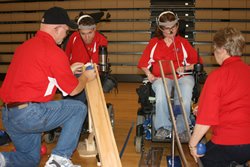
Photo by Marc Anderson
Using chutes and ramps, Topekans Austin Hanson and Lee Lobmeyer, a Christ the King parishioner, are able to compete in the international sport of boccia. Both Hanson and Lobmeyer will compete Aug. 18-27 at the 2011 World Cup in Belfast, Ireland. The World Cup is the last major international boccia competition prior to the 2012 London Paralympic Games and will include athletes from more than 30 countries. Each competing athlete is allowed one assistant. Above left, Hanson’s father, Gary Hanson, and Lobmeyer’s mother, Cathy Drobny, serve as the athletes’ assistants.
by Marc and Julie Anderson
Special to The Leaven
TOPEKA — With only a year before the 2012 Summer Olympic Games, athletes across the world are hard at work practicing almost every sport imaginable — from table tennis to synchronized swimming.
With daily training regimens, these Olympic hopefuls prepare day in and day out, dreaming of that one day when they will stand on that victors’ podium, representing their country.
In Topeka, two athletes share a similar dream — not for the Olympic Games, but for the 2012 Paralympic Games.
Lee Lobmeyer and Austin Hanson are members of America’s 2011 World Cup team in the sport of boccia. Lobmeyer, who belongs to Christ the King Parish in Topeka, and Hanson, her partner, will compete Aug. 18-27 in Belfast, Northern Ireland, for the World Cup.
The event is the last major competition prior to the 2012 Paralympic Games and demands not only physical training but also spiritual and mental preparation — not to mention some creative fundraising. Both team members must raise $8,000 each for the competition.
According to its Web site, the Paralympic Games are exactly the same as the Olympics . . . with one slight difference: The elite games are sports events for athletes with physical disabilities. Rather than emphasize the athletes’ challenges, however, the games focus on the participants’ unique achievements.
First organized in Rome in 1960, the Summer Paralympic Games have grown from 400 athletes from 23 countries in 1960 to nearly 4,000 athletes from 146 nations in 2008.
Boccia is an adaptive version of bocce, a game of Italian origin similar to lawn bowling. This sport is reserved for those athletes who have quadriplegia. Played on either a specially-marked court or a gym floor, the object of boccia is simple. Individual players, pairs or teams of three throw or roll a set of game balls so they land as close as possible to a target ball, called the jack.
Boccia has been a part of the games since 1984. Since nearly that time, Lobmeyer (who, like Hanson, has cerebral palsy) has played this unusual game traditionally dominated by male athletes. She earned several medals in the sport, including a bronze medal at the 1988 Paralympic Games in Seoul, Korea, after which she decided to take a break.
About eight years ago, Lobmeyer decided to play again.
“I hit the court really hard,” she said, adding that’s when she and Hanson first paired up as a team. Since then, the duo has won several competitions and remains ranked among the best teams in the world.
To prepare for the Belfast competition, Lobmeyer and Hanson practice a minimum of four hours twice a week, although they often practice much more.
“We are dedicated. We want to win,” said Lobmeyer, adding that she and Hanson have gelled so well as a team that they know each other’s nuances or subtle facial expression changes.
“I can tell what he wants. We’ve got it down to one or two words now,” Lobmeyer said, Words such as “up,” “down,” “knock it” or “kiss it,” she said, might mean nothing to spectators, but convey an entire strategy between teammates.
Besides physical training and strategy coordination, the duo relies heavily on their shared Christian faith to see them through the highs and lows of competitions.
“When I am making a tough shot, I pray a Hail Mary,” Lobmeyer said, adding that her mother, who serves as her assistant, prays a rosary.
“I come in on the court very calm, and I stay calm,” concluded Lobmeyer. “I’m calm because I am asking God for help.”






